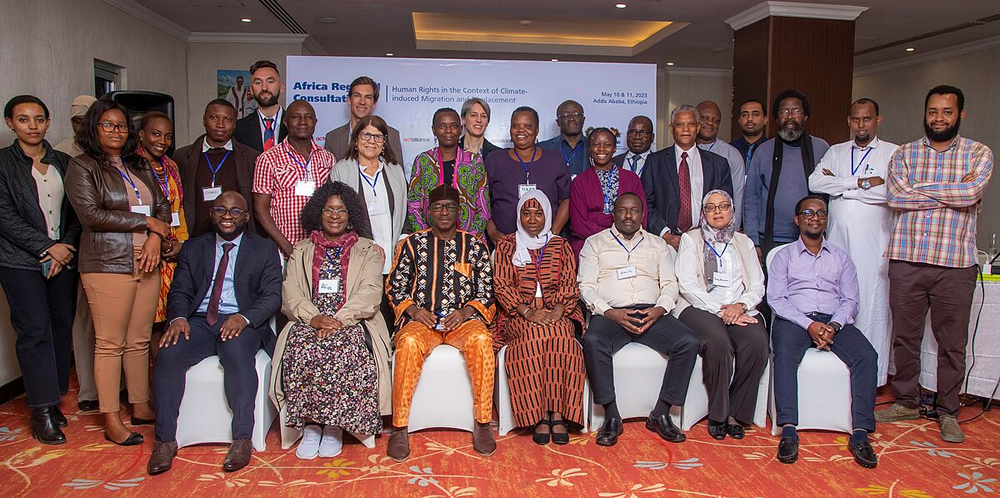
Climate Displacement in Africa; Regional Consultations
Published: 26 May 2023

Participants of the Consultation workshop in Addis Ababa - Ethiopia, May 2023
Over the course of two days, a number of outcomes were approved, including the development of a brief concept paper, which highlights opportunities for identifying responses in coherent and adequately funded Africa, based on human rights, gender, and climate justice. Civil society organizations are to use the paper for advocacy at both national and regional levels.
The cases of climate displacement are increasing due to the impacts of climate change, requiring action to support communities and people at risk and to provide practical solutions that create opportunities for safe migration. A wide range of potential responses to climate-related human mobility are required, including legal and institutional policy reforms, as well as practical support mechanisms, before, during and after migration and displacement resulting from climate change. These solutions ought to guarantee human rights, and preserve the dignity and safety of affected persons, whether they are displaced persons or migrants within areas at risk, while addressing movement within and across borders.
Within the framework of the global call to address issues related to human rights and protection gaps in the context of climate and human mobility in 2023, the Climate Migration and Displacement Platform (CMDP) and the ACT Alliance, in cooperation with the German Friedrich Ebert Foundation, organized a series of national and regional activities related to human rights and justice, in response to the effects of climate change on displacement and migration, where a series of regional consultations are being organized with civil society organizations in Latin America, Asia, the Pacific, and Africa.
These consultations aim to develop common understandings of potential current and future trends in climate-induced human mobility, including displacement and migration, and to identify strategies for targeted institutional and structural advocacy engagement. In particular, the consultation seeks to identify ways for civil society organizations to build coordinated national and regional responses to migration as a result of climate change impacts, including through partnerships with grassroots networks and research communities.
The Egypt Nile Discourse Forum (EgNDF) participated in the regional consultative meeting for Africa, which brought together representatives of civil society organizations, researchers, leaders of communities affected by climate change, and activists in the field of climate response and that of protection and defence of migrants' rights.
This meeting is the first step to identifying ways to frame climate-related migration issues in Africa, including possible solutions for policies and practices in the context of human rights, as well as climate programming and advocacy. It also includes a review of existing watch lists for climate-related migration and displacement patterns on the African continent.
The meeting was held in the Ethiopian capital, Addis Ababa, included representatives from Egypt, Morocco, Mali, Malawi, Zimbabwe, Zambia, Kenya, Ethiopia, Somalia, Tanzania, Sierra Leone, Rwanda, Nigeria, Liberia, Gambia and South Africa, discussed: prioritizing goals and strategies to enhance migration advocacy, climate action at the national, regional and global levels, as well as considering ways to enhance civil society collaboration to advance climate change migration solutions.
Over the course of two days, a number of outcomes were approved, including the development of a brief concept paper, which highlights opportunities for identifying responses in coherent and adequately funded Africa, based on human rights, gender, and climate justice. Civil society organizations are to use the paper for advocacy at both national and regional levels.
The meeting also recommended directing civil society organizations and grassroots networks in their exchanges with national and regional decision-makers, which contributes to coordinating messages across various policy sectors and social movements, including messages related to technical support, capacity building and necessary financing, in line with the national priorities of each country.

